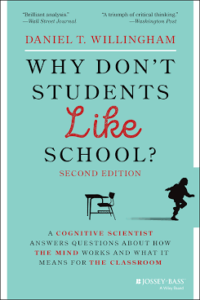

The ten cognitive science principles for teachers that Willingham highlights are principles that he argues: (1) are true all the time and across contexts, (2) have robust supporting evidence (which Willingham organizes into comprehensive lists to help readers learn more), (3) can impact student performance, and (4) have actionable implications for teachers. By offering insights into students’ minds, Willingham aims to help teachers improve their practice not by prescribing how to teach, but by giving insights into what teachers might expect from their students based on the teaching decisions they make. Willingham is par excellence in his ability to translate cognitive science for an educator audience; this evidence-based, comprehensive synthesis will be of great utility for many educators, and the thought-provoking questions he includes throughout make this book an excellent option for a teacher book club/discussion group.
Much of the reason that students don’t like school (aside from social challenges) has to do with the fact that school rarely finds the sweet spot between to-be-learned content being too hard and too easy, according to Willingham. While we are naturally driven to satiate our curiosity, we also find thinking to be difficult and will default to what we remember rather than puzzling through something new. To make students more inclined to learn teachers can pique curiosity by explaining the question behind content the teachers wish students to learn, connect with students in other ways they find engaging (e.g., through comedy, stories, and demonstrating care), and avoid overloading the amount of information students have to hold in mind at one time.
Many teachers are concerned that teaching students the kinds of facts they need to perform highly on standardized tests undermines efforts to help them develop deep thinking skills or to think like a “real scientist” or a “real historian.” Willingham argues that students are well-served to learn the background information that they do in school because they need these facts to become strong readers and critical thinkers who are able to connect disparate ideas, hold information in mind, and develop sound predictions. Additionally, Willingham explains that the more one knows, the more one is able to acquire additional knowledge.
Experts–people who can create new knowledge in their field after practicing in the field for many years—think qualitatively differently than do novices. As such, we should strive for students to develop a deep understanding, but not to do exactly what experts do, since these same behaviors may not be fruitful without first having that deep understanding. To facilitate deep understanding and abstract thinking educators can help students link new content to information they already know, provide diverse and familiar examples of a concept, and offer analogies. We remember what we think about; to help students remember content, educators should reflect on what their lessons make students think about. Persuading students of the value of knowing the content, using a story-like arc in lectures, and engaging students emotionally can facilitate long-term memory. For memorization of basic information, Willingham lists several common mnemonics (e.g., using acronyms) that can be helpful.
The role of intelligence in education is a perennial and thorny issue. Importantly, Willingham notes the inherent worth of all students regardless of intelligence or talents. He provides convincing evidence that intelligence can change with hard work and is more affected by our environment than genes. Focusing on the learning process rather than raw abilities, teaching that hard work pays off and that proficiency requires practice, and normalizing failure can lead to a boost in students’ academic performance. (Willingham notes, however, that effects of a so-called “growth mindset” on academic performance are small and there is not sufficient evidence about how to teach this mindset successfully in school.) While there is true variability in students’ intellectual abilities, Willingham shows that there are not consistent differences across people in the way they learn (i.e., their “learning style”). Willingham argues that the content to be taught, more than the learning format preferences of students, should drive the way one teaches a lesson.
Educators have heard too many promises about a tech-based education revolution. In spite of this, Willingham argues that technology has not fundamentally changed how our minds work and the effects that it does have on cognition are often unexpected. Willingham suggests that before adopting new technologies in schools, educators consider the evidence about the tool. Screen time can take students away from devoting their time to activities that might provide greater cognitive benefit and a reprieve from social pressures. For these reasons, it may be beneficial to limit technology use.
After devoting considerable attention to the minds of students, Willingham concludes by considering how teachers can support their own cognitive and professional growth. Teaching, like any cognitively demanding skill, must be practiced to lead to improvement. That practice should include measures such as isolating individual subskills to refine, receiving feedback from knowledgeable colleagues, trying new techniques, watching tapes of one’s own teaching, learning more about human development, and recognizing that the process of improving may be hard on one’s ego.
Why Don’t Students Like School? is great summer reading for teachers looking to improve their practice. For other works by Daniel Willingham, see The Reading Mind and Raising Kids who Read.
Willingham, D. T. (2021). Why Don’t Students Like School? Second edition. Hoboken, NJ: Jossey-Bass.




